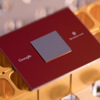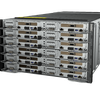A research team at Northwestern University has developed a memtransitor, a device that could be the basis for advanced neuromorphic computers.
OnScale has emerged from stealth mode, unveiling a suite of CAE tools and plugins designed to run in HPC cloud environments.
An international team of researchers have developed an algorithm that represents a big step toward simulating an entire human brain on future exascale systems.
Episode 214: Addison Snell and Michael Feldman analyze this week's top HPC news, including Lenovo's new water-cooled HPC system and the latest US Exascale project budget.
Googles Quantum AI Lab has revealed it is testing a 72-qubit quantum processor in its bid to become the first companyto demonstrate quantum supremacy.
Niagara, Canadas newest multi-petaflop supercomputer tasked for academic use, is now available to researchers across the country.
Chinese-base tech giant Alibaba is challenging American cloud providers in Europe with an HPC service designed for users runninga variety of compute-intensive and data-intensive workloads. The company also unveiled a new cloud-based quantum computing platform.
The US Department of Energy (DOE) would reap $636 million for exascale computing next year if Congress gives the go-ahead to President Trumps budget request for FY 2019. The amount requested is $376 million above the funding level for FY 2017.
Legal tech startup LawGeex has published a study demonstrating their artificial intelligence software is able to identify issues in Non-Disclosure Agreements (NDAs) faster and more accurately than experienced lawyers.
Lenovo has unveiled the ThinkSystem SD650, a densely constructed, direct water cooled server aimed at the HPC market. Its first big test will come later this year when it's deployed in Germany's most powerful supercomputer, the SuperMUC-NG.









